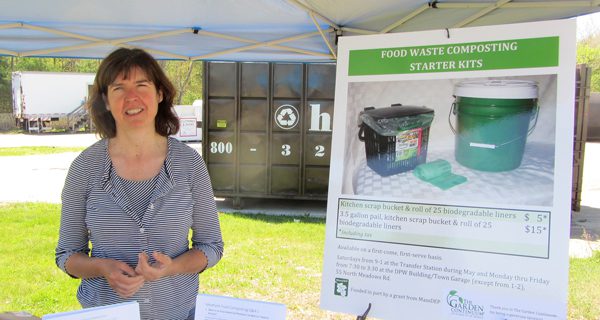[ccfic caption-text format="plaintext"]
by Stephen Press
Hometown Weekly Staff
"Every Saturday, there's at least one collection of something through May, and again we do it in October," said Barbara Meyer, who sits on the board of Medfield Green and the Transfer Station Recycling Committee. "We do the Styrofoam every time, as well as once sometime after Christmas."
Meyer was one of the volunteers who'd come to help on Saturday, May 14, at the Transfer Station for Styrofoam collection day. A short walk away, composting materials were displayed under a tent. The day, hosted as part of Medfield Green Month, appeared a smashing success as car after car pulled up to fill boxes with packing refuse.
"Historically, when we first started it, it was a one day event," said Helen Dewey, President of Medfield Green. "We held it at the American Legion and we had all different vendors. We actually - Medfield Green, a non profit - had to pay to use the parking lot. Then we kind of thought about it and we were like: 'You know what, the town of Medfield kind of needs to be more involved in this.' So we moved to the Transfer Station and we started doing a whole month-long event with a different vendor each Saturday. We do it in May and we do it in October." Dewey noted that Styrofoam collection was particularly popular. "It's really caught on. People are like: 'So when's the Styrofoam collection? I've got my Styrofoam!' So we added another Styrofoam collection after the holidays, which is great."
Under a nearby tent and next to a poster displaying a composting starter kit, Rachel Brown stood behind a table, ready for any and all questions. She pointed at two large green plastic bins by the side of the Transfer Station. "Our goal is to sort of educate the public that they can use this in addition to other composting methods," she said.
"The Transfer Station and Recycling Committee got a grant from the Massachusetts Department of Environmental Protection - they're trying to divert food waste from the trash stream, because 20% of trash, they believe, is food waste," said Brown. "If we can divert that into compost, our costs as a town are significantly less, because we can do it for $40 a ton by composting, where it's close to $80 a ton for hauling and incinerating the trash. Then you also think of the carbon footprint - they can reuse that in composting for soil enrichment product, whereas if you're incinerating it, you're sort of creating the global pollution gases."
"Many of our residents do backyard composting that can take fruits and vegetables, but because we're using a commercial composting facility, we're able to take meat, fish and bones," she pointed out. "The advantage of that is those are the heavy weight food items that commercial composting can process at higher heat levels. It can break them down. Fibrous products like corn husks, fruit pits that you might have difficulty doing with backyard composting - you can do that here at the transfer station."
"We're helping residents, if they're interested, with starter kits," she added.
A starter kit contains a small kitchen scrap bucket (a family of four is expected to go through two to three buckets full of compost in a week), as well as biodegradable liners that can go directly into the plastic compost bins. There's also an animal and odor-proof plastic pail that can be used to store the full liner bags before they're transported to the Transfer Station.
The next Medfield Green Month collection will be on Saturday, May 21, from 9 a.m. to 1 p.m. It will focus on high quality reusable building materials. Additionally, the food waste recycling tent will be set up for residents who'd like more info on composting.










